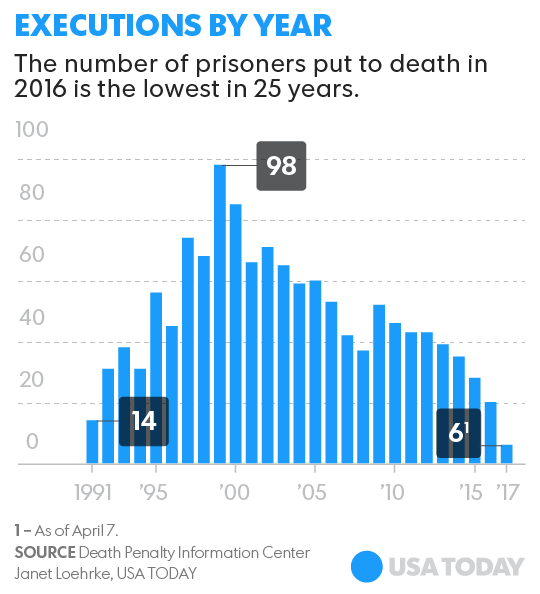Pause on Arkansas executions highlights national trend
An unprecedented series of recent court rulings that halted the execution of eight Arkansas prisoners reflects a decades-long national trend that has sharply curtailed the use of capital punishment.

Death penalty experts say the court decisions are in keeping with a number of factors prompting executions in the United States to decline, including challenges based on DNA evidence, litigation over the drugs used in executions and increased use of life without parole as a sentencing option.
Federal judge blocks 6 executions in 10 days in Arkansas
Here are the 8 inmates Arkansas planned to execute in 11 days
Arkansas judge blocks state from using lethal drug
Prisoner executions nationwide have plummeted over the past two decades, decreasing nearly every year since 1999, when 98 prisoners were executed. There were 20 prisoner executions nationwide in 2016, the fewest since 1991.
The growth of life without parole as a sentencing option in many states, as well as the high cost of prosecuting a capital case, has led prosecutors to push for the death penalty in fewer cases, said Michael Benza, senior instructor of law at Case Western Reserve University School of Law.
“If you think of the death penalty as sort of a freeway, it’s actually becoming more of a country lane with everybody peeling off into all kinds of different non-capital ways,” he said.
Deborah Denno, a professor at Fordham University School of Law, said the use of DNA evidence has led to closer scrutiny of death penalty cases by both the legal system and the general public.
“We’ve seen a precipitous decline since 1999 and probably a lot of that had to do with these innocence cases,” she said. “Attorneys were starting to introduce DNA into court, and you had these cases showing that people were innocent.”
Although lethal injection became the nation’s primary method of execution in the 1990s, Denno said it is only in recent years that sustained challenges by death row inmates and death penalty opponents have gained traction in the court system.

On Saturday, a federal judge ordered Arkansas to halt the planned executions of eight prisoners in less than two weeks, which Gov. Asa Hutchinson said were necessary because the state’s supply of one of three drugs used in executions was set to expire.
In Saturday’s ruling, U.S. District Judge Kristine Baker issued an injunction blocking the state's plans on the grounds that the condemned inmates have a right to challenge the drug protocol that would be used to execute them.
“A condemned prisoner can successfully challenge the method of his or her execution by showing that the state’s method ‘creates a demonstrated risk of severe pain’ and ‘the risk is substantial when compared to the known and available alternatives,’ ” Baker wrote. The federal ruling followed federal and state court decisions that also dealt setbacks to the execution plan.
Robert Dunham, executive director of the Death Penalty Information Center, which advocates against capital punishment, said the nation is “in the middle of a major climate change of the death penalty.”
"When the executions have been delayed, new evidence has been discovered in a number of cases that has later become the basis for overturning them,” Dunham said.
Joshua Marquis, the district attorney for Clatsop County, Ore., and a proponent of the death penalty, attributed the decline in executions to a decrease in the number of murder cases in which the death penalty might be appropriate.
Most Americans continue to support the concept of a justice system that includes the death penalty, he said, noting that since 1964, no state has abolished the death penalty by popular vote.
“I think what you’ll see with the death penalty is fewer (executions),” Marquis said. “But I think states will maintain it — unless, of course, there’s some sort of sea change in American opinion.”